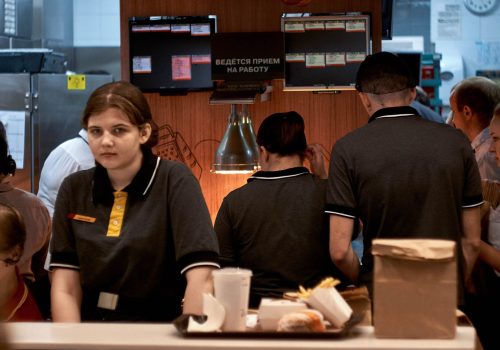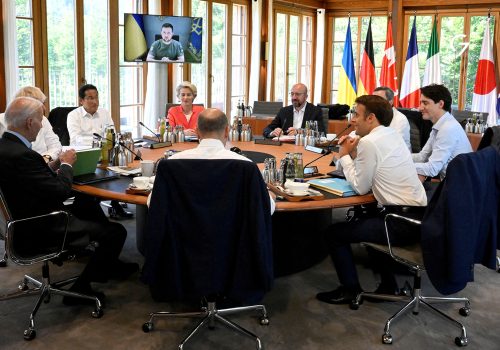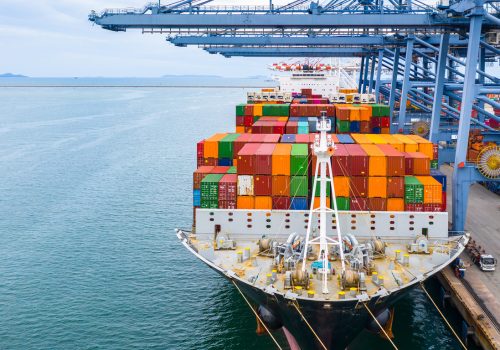Ukraine needs more international support
The war in Ukraine has entered its fifth month and risks becoming severely protracted. The international community must step up its efforts to support Ukraine now by advancing Ukraine’s proposed roadmap to end the war and clarifying its economic policies in response to Russian aggression.
The US, EU and the UK should first engage in serious consultations with Ukraine to reach agreement on a roadmap to end the Russian war of aggression in Europe. President Zelenskyy has said that there should be a ceasefire; the withdrawal of Russian troops to pre-February 24 borders and territorial negotiations; and negotiations about Ukraine’s promise not to seek NATO membership in the context of ironclad international guarantees for Ukraine’s independence, sovereignty, and territorial integrity.
Within this context, with full respect for Ukraine’s sovereignty, independence, and freedom, Western powers should agree upon and announce their conditions for removing sanctions in Russia. Specifically, the question of when and how to remove sanctions is not straightforward. The stated intention to maintain open-ended sanctions even after Russia agrees to end the war (aiming to punish its war of aggression) would offer no incentives for Putin to enter into negotiations, instead eroding Western domestic public support for sanctions as high energy and food prices persist. On the other hand, Russia could interpret an ill-timed lifting of sanctions as a sign of the West’s weakness. Russia may deem the West’s counter-measures bearable, thus encouraging Putin to continue the war to gain more territory. Removing sanctions—fully or partially—must be part of the negotiations to end the war. The sooner the West and Ukraine can agree on this key issue, the better.
In the meantime, to induce Putin to the negotiating table, Western sanctions on Russia need to be seriously tightened to impose a meaningful cost to Russia’s invasion of Ukraine—mainly by launching and strictly implementing a new barrage of trade and investment controls over more sectors and entities of the Russian economy. At present, the ban on Russian oil imports is partial and slow to impact its economy. So far, Putin has been able to reap a huge windfall due to energy price spikes. In the first half of 2022, Russia’s current account surplus has jumped to US$138.5 billion—more than tripling the surplus in the comparable period in 2021—providing Putin with ample finance to pursue the war.
The EU has already taken steps in the right direction by agreeing to ban sea-borne oil import from Russia, which will cut such deliveries by 90% by the end of the year. The EU should move expeditiously to address the remaining 10% of Russian oil import via pipelines to complete the ban. In addition, the EU has coordinated with the UK to ban the provision of maritime insurance coverage, especially for protection and indemnity (P&I), to tankers carrying Russian oil mainly using the London-based Lloyds syndicates. Other major countries such as the US and Japan should implement a similar insurance ban to close possible loopholes. In addition, the G7 has proposed a cap on Russian oil and gas prices. All together, these measures could cut up to one-third of Russian energy export revenue— estimated to be $285 billion in 2022 (or 20% more than in 2021) if sanctions as of June 2022 are maintained for the whole year.
In addition to clarifying its sanctions policies, the West should fully deliver the financial and military assistance it promised to Ukraine. So far, Ukraine has received less than half of what has been pledged—it needs $5 billion a month to meet government expenditures. To help facilitate and ensure the transparency and robustness of the disbursement of financial aid to Ukraine, the IMF (as well as the World Bank) has established an administered account for Ukraine—these accounts should be utilized as they can enhance the confidence of the public in donor countries that aid to Ukraine has been processed properly and used. It should be highlighted that despite the war, Ukraine has been able to maintain a functioning financial infrastructure to support economic transactions.
Ukraine is currently in discussion with the IMF for a new support package. Given the difficult task of envisioning a program to a country still at war, there should be a joint IMF/WB operation to leverage the comparative strengths of both institutions. Moreover, the discussions should include considerations of debt relief by Ukraine’s international public and private creditors.
There should also be detailed discussions about how to make use of the assets of Russian oligarchs and sovereign entities, including the central bank, currently being frozen under Western sanctions. Canada passed legislation in June to confiscate Russian assets to support Ukraine; other countries should follow this example to aid Ukraine now even while the war rages. Even though such discussions are complicated and may look premature, they can help sketching out the parameters of a possible Marshall plan to help Ukraine rebuild their savaged economy—estimated to suffer more than half a trillion dollars of losses. The creation of a post-war vision of Ukraine is important to sustain the hope of the people fighting for their country.
Indeed, if the post-war reconstruction with determined domestic reforms can produce a democratic Ukraine with a functioning market economy embedded in the EU, that could be regarded as a victory of Ukraine and the international community over Russia’s brutal war of aggression.
Hung Tran is a nonresident senior fellow at the Atlantic Council, former executive managing director at the International Institute of Finance and former deputy director at the International Monetary Fund.
Charles Dallara is a former Assistant Secretary for International Affairs at the U.S. Treasury Department.

At the intersection of economics, finance, and foreign policy, the GeoEconomics Center is a translation hub with the goal of helping shape a better global economic future.
Related reading
Image: Lviv, Ukraine. November 28, 2013. Ukrainian students attending pro EU manifestation in the city center.


